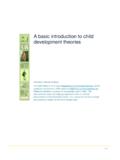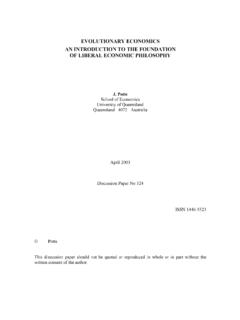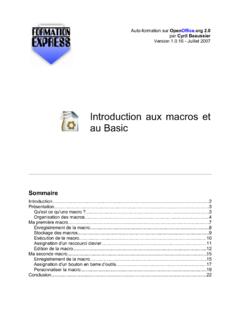Transcription of Introduction to Intellectual Disability
1 Introduction to Intellectual Disability What is Intellectual Disability ? Definitions of Disability A different view of Disability Recognising Intellectual Disability from other conditions Appropriate language Disability Etiquette Communication tips Writing in Easy English Disability Standards and Discrimination IDRS Inc. 2009 Introduction to Intellectual Disability Page 2 of 16 What is Intellectual Disability ? a Disability that affects the way you learn you can be born with an Intellectual Disability or acquire one under the age of 18 it can affect a person in the following ways.
2 O it may take longer to learn things o the person may have difficulty reading and writing o it can affect how the person s communication o it will affect the person s understanding o the person may find it difficult to maintain eye contact o the person may have difficulty understanding abstract concepts o it may affect the person s ability to plan and to problem solve it may affect the person s ability to adapt to new or unfamiliar situations it can involve the person presenting well cloak of competence Clinical definition of Intellectual Disability Intellectual Disability is a Disability which occurs in the developmental period of life ( before the age of 18) and is characterised by below average Intellectual functioning.
3 Most people with Intellectual Disability are born with the Disability . Clinically, and for the purposes of proving in a court that a person has an Intellectual Disability , Intellectual Disability is best assessed by a psychologist as: an IQ of 70 or under, PLUS deficits in at least 2 areas of adaptive behaviour, ie: o communication o self-care o home living o social skills o self direction o leisure and work o learning. 2-3% of the New South Wales population has an Intellectual Disability IDRS Inc.
4 2009 Introduction to Intellectual Disability Page 3 of 16 In clinical terms, Intellectual Disability is often defined in terms of the severity of the Disability : Level of Disability % of people with Intellectual Disability IQ BORDERLINE 70-75 MILD 75% 55-70 MODERATE 20% 30-55 SEVERE 5% under 30 This approach, however, encourages a focus on the deficits of the person, rather than the abilities and is a medical way of looking at Disability , but for the purposes of proving to a court that a person does have an Intellectual Disability , it is what is required.
5 This is the medical model of Disability People with Disability should adapt to the world as it is IDRS Inc. 2009 Introduction to Intellectual Disability Page 4 of 16 Sociological definition of Intellectual Disability A more constructive and pragmatic definition is to define Intellectual Disability in terms of the support needs of an individual. This approach sees the effect of the Disability as something that will vary and can be increased or decreased by external factors. It does not view Intellectual Disability as an unchangeable characteristic of the individual.
6 This definition does not rely on the capacity of the person being set in stone, but also on the environment and the support that they receive. So, adjusting the environment and the support to meet the person s needs can increase the person s capacity and reduce the effect of the Disability ! The social model sees the 'cure' to the problem of Disability in the restructuring of society. Unlike medically based 'cures', which focus on the individual and their impairment, this is an achievable goal and to the benefit of everyone.
7 This approach suggests that the individual and collective disadvantage of people with a Disability is due to a complex form of institutional discrimination as fundamental to our society as sexism, racism or heterosexism. IDRS Inc. 2009 Introduction to Intellectual Disability Page 5 of 16 Intellectual Disability is different from other cognitive disabilities Mental illness o Often episodic o Affects perception and mood o Schizophrenia, Depression, Bipolar Affective Disorder (used to be known as manic depression) o For further information contact the Mental Health Information Service 9816 5688.
8 Website Brain injury o can be caused by stroke, accident or drug/alcohol o can impair memory, thinking, perception, attention and emotions. The brain injury can result in disinhibited behaviour or poor impulse control. o People rehabilitate over time years o For further information: contact the Brain Injury Association Ph 9749 5366. Website: Dementia o loss of short-term memory o progresses into confusion/disorientation o Alzheimer s Disease is one type of dementia o For further information contact the Alzheimer s Association Ph 9805 0100.
9 Website: Autism o Lifelong developmental Disability o Affects ability to relate to people and the world around them o Impairs social interaction, communication and behavior ( eg may be compulsive) o Often experience overwhelming anxiety, frustration, confusion o Most people with autism have some degree of Intellectual Disability but not all. People with Asperger s syndrome generally have average to above average intelligence o Website: IDRS Inc. 2009 Introduction to Intellectual Disability Page 6 of 16 The Power of Language The use of appropriate language is not just an exercise in political correctness.
10 It is exercising respect for the people that you are speaking about or to. Language is not fixed and changes with time to reflect changes in government policy, public perception and, for many groups, a move towards more equal opportunity. Up to the 1980 s policies of institutionalisation for handicapped people were the norm. People lived in cramped wards where their basic physical needs were met and little else. These people were seen as numbers in many cases. They were seen to have no value in society; they could not work or contribute in any way.


![naray[sU´m [Narayana Suktam] Introduction - …](/cache/preview/2/c/f/7/f/6/4/f/thumb-2cf7f64f54385035062820f105924f4c.jpg)





